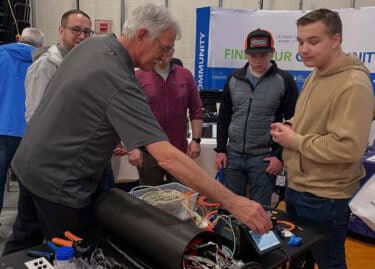Manchester Community College is developing programming and partnerships for the “new collar” workforce
Manchester, NH – Building a robot requires mechanical engineering to design and assemble it, electrical engineering to power it and give it the capabilities to do certain tasks and computer engineering to operationalize it. Understanding the interactions among these three skill sets is the core of mechatronics, an emerging industry that has significant growth opportunities. Manchester Community College (MCC) is building academic programs and business partnerships now to help plan for the future and train individuals with these highly desirable and marketable skills.
Mechatronics –also called mechatronic engineering – is a multidisciplinary branch of engineering that focuses on the engineering of both electrical and mechanical systems, and also includes a combination of robotics, electronics, computer, telecommunications, systems, control and product engineering. Ultimately, it is about being able to build and operate smart machines. Examples include industrial robots used to build automobiles or high-speed processing manufacturing systems that are in many modern factories. This type of advanced manufacturing does not take place on machine shop floors – it’s all done in technologically enabled clean rooms.
Jobs that require these skill sets can be found in advanced manufacturing companies and others that rely on automation. MCC has long-standing partnerships with many of these companies, including DEKA, Hitchiner Manufacturing, L3Harris, BAE Systems, Millipore, GE, ARMI and more. Through these partnerships and the training and education programs MCC builds and runs to help train workers, MCC faculty and staff are able to see the trajectory of technology and innovation and help align training and education to meet those future needs. That trajectory is pointing in the direction of mechatronics.
“In the past, manufacturing was primarily staffed with blue collar workers. In the near future it is going to be a new-collar worker that is multi-disciplined. As we continue to automate more and more processes, those with mechanical, electrical and computer skills can look at challenges from a systems perspective rather than individual pieces so when they troubleshoot, they troubleshoot as a system,” said Dan Larochelle, professor and chair of the Advanced Manufacturing Department at MCC.
Currently, MCC offers an Associate of Science in Advanced Manufacturing with a concentration in Mechatronics. Industries across the region have been reaching out to MCC to connect with future graduates about internship and employment opportunities.
“Everyone’s manufacturing now has to be dynamic. Today, technicians are really multi-disciplined and highly valued employees for a company since they can be put on a variety of projects. Industry 4.0 – that’s the fourth industrial revolution where now things are being custom made to order so manufacturing has to be flexible and configurable so it can meet customers’ demands now and into the future,” said Tim Sullivan, vice president of corporate affairs and services at Hitchiner Manufacturing Co., Inc.
The field of mechatronics is relatively new and since it represents a merging of disciplines, there is no data on current jobs and salaries. However, electrical, mechanical and computer engineering are top skillsets that are in demand today and projected to grow over the next decade. Larochelle regularly fields calls from industry representatives looking for graduates with these skills and uses these contacts to continually build MCC’s class offerings. This feedback will help MCC ensure that its graduates with skills and training in mechatronics will be job ready and able to work in ever-changing fields where innovation is a daily occurrence.
In 2019, Larochelle and his team earned a $300k National Science Foundation’s Advanced Technological Education (NSF ATE) grant to promote mechatronics. This program is called the Mechatronics Awareness Project (MCC MAP). It has three main goals: curriculum development, professional development and recruitment/awareness. MCC is enhancing its current curriculum so students can earn stackable mechatronics credentials. MCC works with several high schools including Con Val Regional and Spark Academy. Additionally, the college collaborates with extraordinary leaders in the field, such as MCC Adjunct Professor Frank Xydias of Milford High School, to teach mechatronics courses in high school and create pathways to the Advanced Manufacturing Program at MCC. Faculty at MCC and the partner high schools will also receive specific mechatronics training this summer so they can start offering mechatronics certifications to their students. The main goal of this project is to make people aware of the many career pathways in advanced manufacturing and mechatronics and prepare students to enter the workforce with the multi-disciplined skill set that employers are in looking for.
To learn more contact Department Chair of Advanced Manufacturing, Dan Larochelle at [email protected] or visit mccnh.edu.
Photo caption: Manchester Community College Associate Professor Keith Calderone and student Ryan Dube show the prototype of the Low Cost Mechatronics Trainer.



